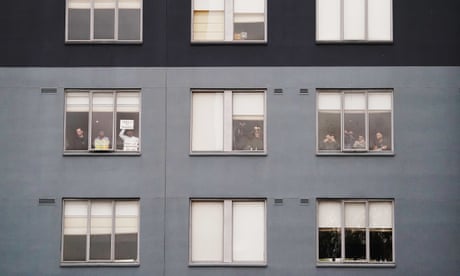- by foxnews
- 08 Apr 2025
Call for UN torture watchdog to investigate Australia’s handcuffing of asylum seekers en route to medical care
Call for UN torture watchdog to investigate Australia’s handcuffing of asylum seekers en route to medical care
- by theguardian
- 16 Sep 2022
- in news

The United Nations' torture prevention watchdog has been urged to investigate Australia's use of handcuffs on asylum seekers when seeking medical care - a practice advocates condemn as inhumane and unlawful.
In 2020, the Public Interest Advocacy Centre (Piac) launched a landmark test case in the federal court alleging the practice of handcuffing immigration detainees for medical transfers was unlawful and traumatic, particularly for those with histories of torture and abuse.
Now, Piac has requested the UN's subcommittee on the prevention of torture investigate the practice during its visit to Australia next month. The subcommittee is expected to scrutinise Australia's immigration detention network.
Piac and other advocacy groups say the practice effectively creates a barrier to accessing essential healthcare and is unlawful under the Migration Act and the Disability Discrimination Act.
"We have asked the UN subcommittee to look into this when they visit Australia in October," Piac principal solicitor, Camilla Pandolfini, said.
"It shouldn't take an action in the federal court to ensure people have access to basic essential treatment without the trauma and indignity of being handcuffed to receive it."
The Australian Border Force's detention services manual states the "use of force and/or restraints should only be used as a last resort".
It states that "in the first instance, officers should seek to achieve the desired objective, whenever possible, by de-escalation techniques such as discussion, negotiation, verbal persuasion and cooperation".
But the commonwealth ombudsman's office has, for years, consistently raised the issue of guards using mechanical restraints - usually handcuffs - for routine appointmentsunnecessarily.
"The office also continues to be concerned about detainees being mechanically restrained to attend medical appointments when alternatives such as increased escorts are available," the ombudsman wrote in 2020.
In a 2022 report, the ombudsman found people held in detention centres in Brisbane, Sydney and Melbourne were routinely handcuffed for medical appointments.
"Detainees [in Brisbane] reported they must forego their medical appointments if they do not wish to be handcuffed. Detainees reported that it is humiliating to sit in handcuffs in waiting rooms during offsite medical appointments.
"During our inspection of Villawood immigration detention centre we noted some detainees were restrained during escorts to hospital for treatment after hours. The Office is concerned this practice could result in a reluctance from some detainees to seek medical treatment and be a barrier to detainees receiving medical treatment."
That accords with the experience of the plaintiff in Piac's federal court case, an asylum seeker known by the pseudonym of Yasir. Yasir has a history of childhood torture and abuse and suffers from major depression and post-traumatic stress disorder.
"When I was handcuffed or told I would be handcuffed, I would feel terrible," he said.
"I would start shaking and sometimes vomit or have seizures and injure myself. I missed many medical appointments because the guards said they won't take me unless I am handcuffed. The doctors would ask 'why did you refuse to go to the appointment' and I would say 'I didn't refuse the appointment, I refused the handcuffs'."
An Australian Human Rights Commission report in 2019 found numerous instances where handcuffs or plastic flexi cuffs were used when not warranted.
The AHRC found there existed a policy - since amended - that required all physically fit adult detainees be required to be restrained for any escorts during the first 30 days of their detention, regardless of the risk they potentially posed.
Ian Rintoul, from the Refugee Action Coalition, said the use of handcuffs to restrain people in immigration detention was "routine".
"For the authorities inside the detention centres, using handcuffs, physically restraining people is their first resort, not their last resort."
The home affairs department was approached for comment.
- by foxnews
- descember 09, 2016
Ancient settlement reveals remains of 1,800-year-old dog, baffling experts: 'Preserved quite well'
Archaeologists have recently unearthed the remarkably well-preserved remains of a dog from ancient Rome, shedding light on the widespread practice of ritual sacrifice in antiquity.
read more


